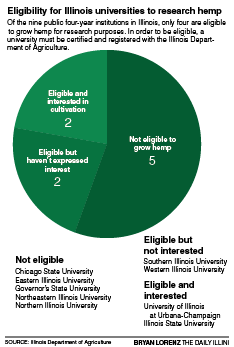Hemp research legalized for Illinois universities

Jan 20, 2015
Last updated on May 10, 2016 at 10:49 p.m.
Four universities within Illinois, including the University of Illinois at Urbana-Champaign, will soon be able to grow hemp for research purposes, thanks to a new Illinois law, HB 5085.
The law, effective Jan. 1, allows universities, which are registered with the Illinois Department of Agriculture, to cultivate hemp for academic research purposes and must study the hemp’s growth, cultivation or marketing. The other elligible universities are Illinois State University, Southern Illinois University and Western Illinois University.
Bruce Branham, crop sciences professor researching weed science, said an eligible university’s decision to actually cultivate and grow hemp is based on whether there are faculty interested in pursuing hemp research, rather than because the law has opened new opportunities for it.
“It’s often a decision made by individual faculty, so it would really depend upon a faculty member that has that interest and wants to take the time to get involved,” Branham said.
Get The Daily Illini in your inbox!
Darcie Shinberger, assistant vice president of advancement and public services at Western Illinois University, said there are no immediate plans to grow or conduct any hemp research in the university’s School of Agriculture. Comparably, Rae Goldsmith, chief communications officer at Southern Illinois University, said the eligible Carbondale campus has no immediate plans.
However, Illinois State University and the University of Illinois at Urbana-Champaign both possess faculty that have explicitly shown interest in the opportunity to conduct hemp research.
Rob Rhykerd, professor of soil science at Illinois State University, said there is a possibility for hemp growth at the university.
“ISU has faculty who are interested in research projects that could lead to growing hemp either in a greenhouse or at the ISU Farm,” Rhykerd said. “But at this time, there is no hemp scheduled to be grown on campus this year.”
Waltraud Kriven, professor of Materials Science and Engineering at the University of Illinois at Urbana-Champaign, currently does research primarily on geopolymers, which are liquid ceramics derived from fibers that can create sustainable construction materials.
Though she has already derived geopolymers from fibers, including corn and jute, Kriven said she believes hemp is a much better source of fiber.
“The strongest of them all is hemp and there are varieties of hemp, and some of them are very good fibers,” Kriven said. “It’s a logical next scientific step to make geopolymer composites with hemp.”
The applications of hemp geopolymers include the development of fiberglass, which can be used in cars among many other things, and agstone, a form of concrete that is much stronger and more sustainable than concrete made from cement, Kriven said.
In addition, Kriven explained the use of hemp’s fibers would be more environmentally friendly, since the geopolymer derived from it solidifies at room temperature, and no energy is wasted in heating to solidify it.
Kriven said she has made contact with local experts, including Luke Haverhals, assistant professor of chemistry from Bradley University, and Eric Pollitt, president of the Global Hemp Inc. in Peoria. She said she would like to collaborate with them to grow structural hemp for fibers, but said she believes it needs to be done through the University to get permission to grow it.
In the meantime, she is currently working on a proposal that she hopes will be the first step to getting hemp research established.
“I’m preparing a big proposal for sustainable materials for energy and environment,” Kriven said. “We’re focused on sustainable materials, and hemp is just one of the examples we’re using, but it’s also the strongest one.”
Kriven also addressed the common concern that hemp grown for research purposes could easily be used to produce marijuana, saying that it would be impossible to gain marijuana from the hemp if they extracted the fibers for research.
“Hemp is good for fibrous material; but when they flower, they become useful for drugs such as marijuana … we need the fibers, we don’t need the flowers,” Kriven said. “That’s why people freaking out that we may produce marijuana don’t know what they’re talking about.”
Kriven said she believes hemp research is beneficial not only to Illinois, but to society, and only good can come from educating people on the various valuable applications of the plant.
“I haven’t got a hidden agenda except to make the world a better place,” Kriven said. “The state of Illinois has got a lot to gain.”
Faraz can be reached at [email protected].





